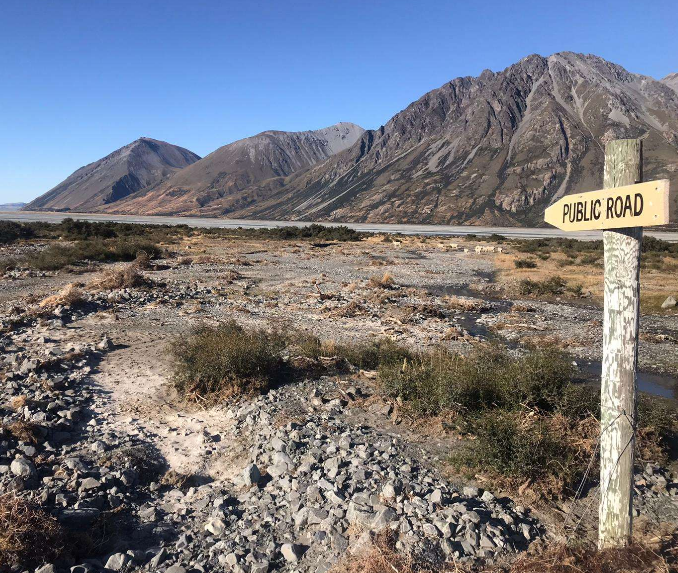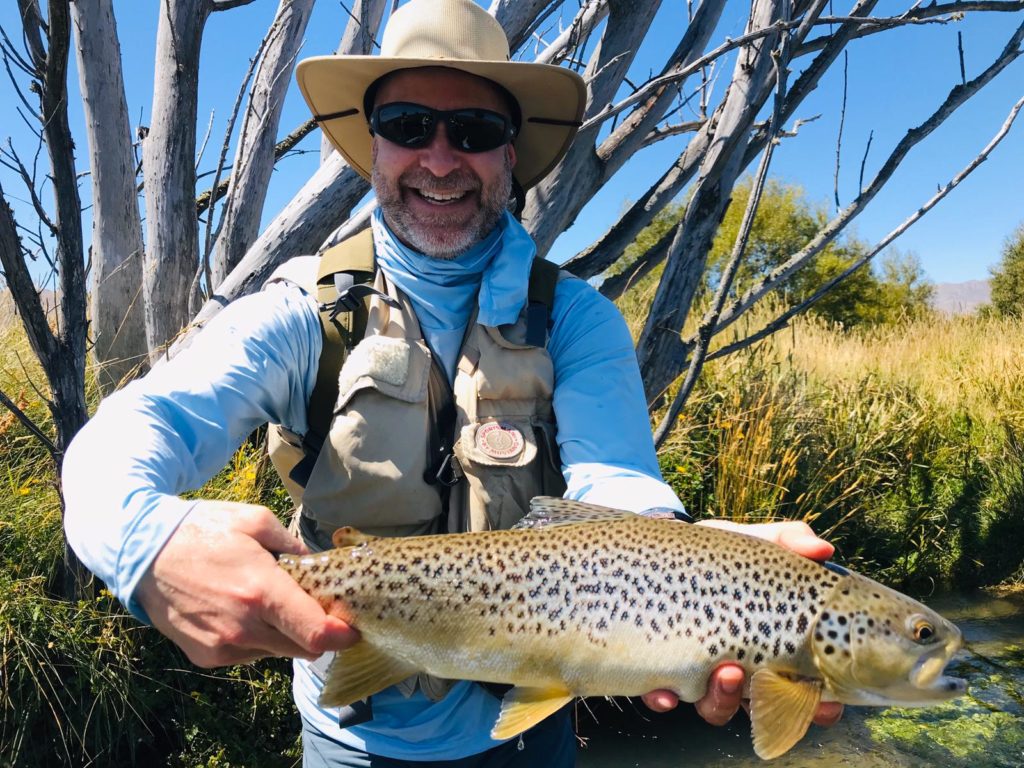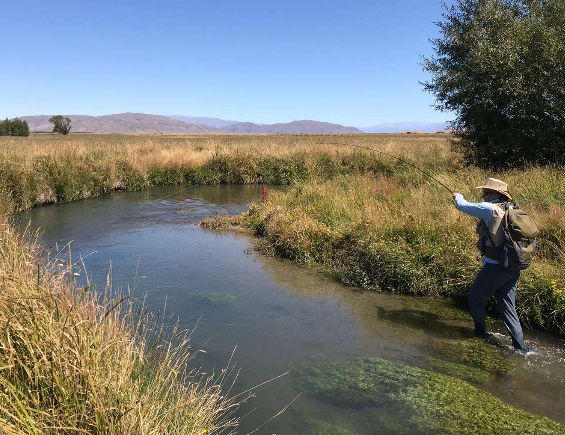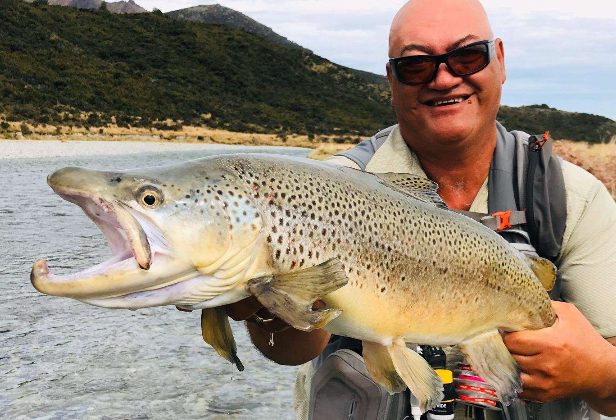


Saturday February 8
I met Rick in the afternoon at the Queenstown airport on the South Island of New Zealand. Rick arrived from Canada about five minutes before I arrived from Melbourne, where I had been working for a few days. Coming into the country we both had to go through biosecurity. They take it very seriously in New Zealand and inspected all our fishing gear and, in Rick’s case, did a little extra cleaning. They really want to prevent Didymo from getting into New Zealand rivers. Didymo is an invasive diatom that exists in British Columbia that grows on rocks and is unhealthy for rivers. This was Rick’s and my first time fishing in New Zealand. February is the height of summer in New Zealand. We stayed at Wyndham Garden Hotel in a single room with two tiny single beds. On the plus side, the room had in-suite laundry, and I did all my dark laundry, as I had been travelling for work the previous two weeks in New Zealand and Australia. We went out to a local eatery, came back to the hotel and slept well. In New Zealand they take their earthquakes very seriously. Many buildings including our hotel have significant structural supports to withstand a large earthquake. Note the cross bracing in the window. Rick, the engineer, was quite intrigued and slept soundly appreciating the structural support.

2 | P a g e
Sunday February 9
We met Dean Whaanga, our guide, at 7 am and had breakfast together at the hotel. We left the hotel at 7:40 and headed toward Twizel (pronounced “tWHY-zl”). It was 7 degrees that morning and mostly cloudy with a few sunny breaks. The high temperature of the day was about 22. On the way to Twizel, we passed wineries, orchards and, of course, many farms for both sheep and cattle. We also saw a lot of cars on the road, as it was a summer long weekend. We arrived in Twizel to pick up lunch and after our stop, we continued northeast on Route 8. Along the way, we drove past Lake Pukaki and had great views of Mt. Cook – New Zealand’s highest peak.
Fishing ethics seem to dictate long distances between anglers, approximately four kilometers. It sounds preposterous coming from North America where fishing ethics are in short supply, and it is not uncommon to have more than one angler fish the same stretch of river. This is due to the relatively small quantity (but large size) of the fish per mile in most New Zealand rivers. The Oreti, one of the rivers we fished, has an estimated 17
3 | P a g e
fish per kilometre, which is considered high in New Zealand. The Madison River in Montana is considered a blue ribbon fishery and it has 2000 to 3000 fish per mile. In New Zealand, if you are the first one at a fishing spot, you leave a note on your car to indicate if you went upstream or downstream. No more than two cars per pullout. We passed Lake Tekapo, turned off the highway towards Mount Dobson ski resort and after a few turns arrived at an access spot on the Opuha River, but there was already a car there. There was no note indicating if the angler had gone upstream or downstream. Not knowing, we left. We took the road towards the Mount Fox ski area and found a suitable place to park. We walked about 3.5 kilometers up river. I caught two brown trout, and Rick caught about five trout (four browns and one rainbow). Unfortunately, the rainbow shook the hook out of its mouth right as Dean was getting ready to net it. The fish was tired and Dean tried to scoop it up in the net, but it swam into deeper water, just out of reach. The Opuha river was quite small, but the fish were relatively large. I caught mine on dry flies. Rick caught his on nymphs with a wool indicator. New Zealand fishers have a particular type of nymphing indicator they use. Rick and I liked it. We are converts and bought some of the kits to bring back to Canada. It doesn’t put a kink in the line, can be adjusted up and down the leader, and is easy to cast. Rick and I were rusty because neither of us had fished in months. We quickly learned that you have to have very accurate casts. An angler gets very few casts per fish, sometimes only one. There was some wind, and we felt the pressure. In New Zealand they also use very long leaders – 12 feet – and then they add tippet to that. I rose about five fish that I missed before I caught my first one. Dean was also teaching us how to play larger trout – side pressure, rod low, stay below the fish and let them run. For the ‘stay below them part’, I even had to run my first fish downstream to keep it hooked.

4 | P a g e
Dean was not in favour of blind casting. During our week fishing with Dean, we very rarely fished a run blind. If Dean didn’t see a fish in a run, we moved on. This is very different from the way Rick and I fish on our own. Dean also introduced us to slow motion videos. He got a good one of me catching a trout. I used waders for the day, while Rick and Dean just wore quick dry pants, known as wet wading. The water wasn’t that deep and it was quite warm. In terms of regulations in New Zealand, one is allowed to use up to 3 flies with barbed hooks. We never used three during our stay, but we did use two many times. We fished from about 12 until 5, after which we returned to our accommodation in Twizel. Twizel is the largest town in the Mackenzie District of New Zealand’s South Island. The population is about 1,300 but increases significantly with tourists during holiday season. The town was founded in 1968 to house construction workers on the Upper Waitaki Hydroelectric Scheme. There are few restaurants in Twizel, so we ate dinner at the Indian restaurant.
5 | P a g e
Monday February 10
We left Twizel just after 7 am and went north on Route 8 towards Lake Tekapo. We stopped in Lake Tekapo at the Greedy Cow so Rick and Dean could get a coffee.
I noticed that there aren’t that many roads in the region, and they are all two lanes with no passing lanes. One often has to take a long path to get to a destination that isn’t far as the crow flies. The roads also have tiny shoulders. I wouldn’t want to be a cyclist on the road. Dean said there are many car accidents on the roads. We arrived at Gray Creek just after 8:30 am. It was a sunny day, and the morning temperature was about 14. Grey Creek is a spring creek, but it wasn’t very clear, hence the name. The day was hot, with a high temperature of 27 degrees at 5:30 when we returned to the truck. Rick only took one water bottle and was parched by the time we got back to the truck. No more one wattle bottle days for Rick!
6 | P a g e
I wet waded on Monday with a pair of wading sandals. It was the right choice given the temperature – I was very comfortable. During the day we crossed many farmers’ fences with barbed wire. On one of them I didn’t lift my leg high enough and ripped my pants. On the positive side, better my pants than my flesh. We saw quite a few fish. I caught one nice fish (a brown trout), and that was it for the Rick-andMark duo. I briefly had another one on the line after a perfect cast, but the fish ran right toward me. Rick caught none today. Some fish we had one cast; some we had many casts. We had quite a few refusals. The creek was small and the fish were quite big.
It was a humbling experience on the overall lack of casting accuracy for both Rick and myself. Dean needed a lot of patience with us. It is so easy, standing on the bank, to see someone else’s casting errors. I should really video myself to try and improve my casting. At times during the day, it was slow for either Rick or myself. Only one of us fished at a time as we only cast to fish that Dean spotted in the river. Dean calls these spotted fish “smudges”. This is a good word for them as they are rarely clearly visible. It sometimes took Rick and me a long time to see the “smudge” that Dean was talking about. A few times we never did see the “smudge” and just cast
7 | P a g e
where Dean told us to cast. In those cases, where we didn’t see the “smudge”, we did normally see the fish bolt away when we spooked it. As a result of all the sight fishing and the relatively few fish in the river, we spent plenty of time waiting around between casts. Dean suggested using a four-weight rod which I didn’t bring with me – I only had two six-weight rods. He let me use an Orvis four-weight Helios rod and reel – a very nice set up! We ate at the local pub for dinner. Rick and Dean had the roast special, and I happily ate the vegetarian pasta.
Tuesday February 11 We left Twizel around 7:15 am, heading north on Route 8 towards Lake Tekapo. We stopped at the Greedy Cow for a coffee and carried on our way. This time we drove up past the top of the lake. We crossed the Macaulay River where there is never a bridge. After some serious off road driving we arrived at the Godley River around 9 am.
8 | P a g e
It was a long hot day. The weather was sunny and warm with a high temperature of about 25 degrees. We walked 18 kilometers and didn’t return to the truck until 6 pm. It was hard walking on rocks the entire time. I wet waded, which was fine, but wearing the wading sandals was a mistake. I ended up with serious blisters and raw spots on both feet. While the scenery was spectacular everywhere we fished, I think this was the most stunning day.
9 | P a g e
I was so close to having a good enough cast on my first fish, but unfortunately I was a little too far left in a slot that was about three feet across. The fish moved over to investigate my fly, but the fly was in too shallow water. I never got another chance; the fish was aware of my presence. On the next cast, it spooked and took off. There was a lot of time in between casting opportunities as Dean spotted a fish only every 250 to 350 meters. Dean did consistently find fish for us, but Rick and I kept missing our opportunities. I probably cast to about 10 fish during the day. Dean’s fish spotting abilities are amazing. On my own, I would have seen about 10% of the fish, whereas Dean sees them well before we even get into casting range. We were very methodical about always walking upstream.
Rick finally hooked into a fish around 3:30 pm. He didn’t land it. Shortly after that I also hooked a fish, but my hand got tangled in the fly line, causing too much tension, which broke the line. Arghh! In the next pool, I caught a fish on a dry and managed to land it. It was our only fish of the day. It was among the smallest fish we saw all day. It was a brown trout, but quite silvery.
10 | P a g e
11 | P a g e
I used my new Orvis Recon rod for the first time. I liked it. I knew my casting could be much better. Sigh… We drove a long way to fish the Godley. Halfway through the day we realized someone was fishing in the area as evidenced by fresh footprints. It was too late in the day to go somewhere else. After that we went in the opposite direction, downstream, to try and get away from the other anglers. Dinner was at the local pub in Twizel, the same place as the night before.
Wednesday February 12 We left at 7 am and drove towards Queenstown. It was cloudy and 12 degrees as we set out. We stopped in at the Wrinkly Ram coffee shop for coffee and a scone.
We fished the Ahuriri River. On the way to the river, we encountered a sheep traffic jam. After getting through the traffic jam, we pulled up to a river access spot around 8 am where two anglers from another car were just putting on their wading boots. As we were the second car there, the river access spot was officially full. We asked the other anglers if they wanted to go upstream or downstream. They choose upstream, so we went downstream. Dean was very happy with the choice. I wondered if he used a Jedi mind trick to get them to say upstream. Both groups of anglers put signs on the windshields of their trucks to indicate where they were fishing.
12 | P a g e
It was a pleasant day, light overcast with a high temperature of 24 degrees. We started out walking downstream to the end of our beat. As we were walking, Dean saw two other people also walking downstream, towards us. Dean went upstream to meet them and ask about their intentions. Dean cuts an imposing figure on the river, and I wouldn’t want to mess with him. The two individuals were “Ross and Jennifer” from Wellington. Dean made sure they got the message that they had to move on below our beat. They were nice and had no problem going below us.
13 | P a g e
I had a good day. I caught three fish (one rainbow and two browns) and missed another. I caught the rainbow on a San Juan worm, and it was particularly acrobatic, jumping many times. I caught the browns on dry flies. I caught my first fish around 10:30 am, better than the day before which was at 4:30 pm.
Rick caught one small fish but had a challenging day. In the afternoon it got windy. That made casting very challenging! Unfortunately for Rick, we fished the far side of the river a lot of which meant backhanded casting (hard). The back-handed casting combined with wind made good casting impossible for our skill level. Dean gave me a bit of a lesson on how to cast into the wind. It made me better, but not great. The key is the back cast – it has to be powerful enough. At the end of the day I could see that Dean had difficulty bending over to undo and take off his wading boots. This is due to a bad back. After noticing, I offered to help Dean take off his boots, which he eagerly accepted. I did so every day for the rest of the trip.
14 | P a g e
Today my feet were sore with many lesions from my walking on the Godley River the day before. Today I wet waded with wading boots. Due to the early start we were back in Twizel relatively early, about 4:30 pm, and had time to do some laundry before going out for dinner.
Thursday February 13 We left the house at 8 am. It was already 18 degrees with dark clouds and some sprinkles. I packed my rain jacket, but never needed it. The weather steadily improved during the day. By lunch time it was quite sunny and 25 degrees. We fished a spring creek north of Twizel.
15 | P a g e
This was perhaps the most exhausting day yet. We fished from 9 am until about 6 pm. We probably only walked 11 or 12 km, but the walking was brutal. Lots of uneven ground and hidden holes in the tussock grass. However, it was very scenic. Rick had a close encounter with a Matagouri bush. The bush is native to New Zealand and loves grabbing onto fly lines. I caught two rainbows. Dean is a brown trout purist and considers the rainbows “trash” fish. Rick and I are quite happy to catch large “trash” fish. I landed the first rainbow, but not the second one, which went tearing into a willow tree along the bank. I caught both of them on blow flies. Rick did have one brown on, briefly, in the morning.
16 | P a g e
Rick caught one rainbow on a San Juan worm pattern blind casting. Initially he didn’t even know it was hooked. Dean didn’t even allow a picture to be taken of Rick’s “trash” fish. I found the morning slow. There were few fish and we missed them all. I think by 2 pm I had only casted to three fish. Similar story for Rick. I had the feeling I saw more fish in the afternoon. I could see that it was frustrating for Dean to deal with our lack of casting skill, but he demonstrated a lot of patience. We saw a cool cloud formation. It came over the mountain top and then down the mountain. It looked like a slow motion avalanche.
17 | P a g e
Dinner was pizza and salad, with the pizza from a roadside stand with a wood fired oven.
Friday February 14 We were up early in the morning and left the house with all our gear at 6:15 am. We were going back to the area around Dean’s house in Riversdale. We started up in Twizel because eight days ago the southern part of the South Island received an enormous amount of rain, close to a meter within two days. There was significant flooding, and the rivers were all blown out. The river levels were receding. The morning weather was very overcast, and we couldn’t see any of the mountains. The forecast was for rain and winds in the afternoon. We drove to Queenstown where we picked up some lunch. Along the way we passed the bra fence. Quite a sight!
18 | P a g e
We drove along Lake Wakatipu, a very long lake that starts just after Queenstown. Dean said it is so large it has tides. It was a day with lots of road work and many stops. We drove through Kingston at the end of the lake and arrived in Garston at 10:30 am. Garston is the most inland village in New Zealand. The landscape in this area is much greener than in the Twizel area. The plan was to fish the Mataura River, however all the access points were full. Dean’s plan B was to fish a creek that flows into the Mataura. Driving in the area, there was evidence of the flooding everywhere – pavement was missing in places, trees uprooted, farmer’s fences were damaged, other fences were completely covered with vegetation that was washed away by the flood, and hay bales had been converted from orderly rows to haphazard placement in fields.
19 | P a g e
We fished from 11 am to 4 pm approximately. Rick caught a brown trout, the first in a few days. Rick missed a few others. I didn’t land a fish, but was very happy to see Rick catch one. I briefly had one on, but it managed to get free. It came after making a good first cast, which made me happy.
I spent quite a long time on another fish, standing on a bank trying to cast to a fish beside a riffle which was making slow, lazy loops looking for food. Dean was able to see the fish on his side of the river and tell me when and where to cast. On one of my better (and longer casts) the fish rose for my dry fly, but missed it. I didn’t flinch. Right after that, as it swam downstream, it gulped my fly. I didn’t wait long enough (for the fish to turn) before pulling the fly out of its mouth. Still, I was happy with my cast.
20 | P a g e
It was a much cooler day with a high of maybe 20. On the plus side it never rained. I found wet wading cold. I could and should have gone with waders. Dean and Rick were fine wet wading. Rick and I were remarking that New Zealand is a very civilized place to fish. There is nothing in New Zealand that can kill you: no bears, cougars, wolves, poisonous snakes, crocodiles or spiders. They do supposedly have big eels in some of the rivers, but we never saw any. We stayed at Dean’s house with his wife Fiona and their pets: Tahu, Lacey and Missy. Fiona is an accomplished cook and kept us very well fed. Dinner was very good – lamb, corn, potatoes, carrots, roasted turnips and yams, and cabbage slaw. On the first night there was also another couple staying there: Brett and Leigh from Melbourne. They had been staying there before we arrived, but their alternate accommodation fell through, so they stayed a few extra nights.
21 | P a g e
22 | P a g e
Saturday February 15
We left Dean’s house at 6:45 am , as he wanted to secure a spot on the Oreti River. We fished the Three Kings Beat. The day started off with a very overcast sky and a temperature of about 9 degrees. It took about an hour to get to our access spot. The Oreti is known for big fish. The saying goes that the fish are born at four pounds. On our way to the river, Dean told us to be ready to run with them, keep side pressure on them and keep them in the shallows. He said to also be ready to cross the river while chasing the fish. That sounded exciting! The overcast clouds soon disappeared, and the morning turned sunny. The high temperature for the day was 24, and it got progressively cloudier after lunch.
23 | P a g e
I wore waders. Dean and Rick wet waded. I was happy to be warm and dry in the morning, but was very hot on the walk back to the truck at the end of the day. It took a lot of effort to keep up with Dean on his marches back to the truck at the end of the day. To do so I would have had to jog. Typically, Dean led the way, with me 100 meters behind him and Rick another 100 meters behind me. Rick and I were just trying to keep the person ahead of us in sight. Rick saw a hedgehog at the end of the day, but he was too tired to take a picture and didn’t want to be left behind. I had a good day. I hooked two fish and landed them both. I caught one on a lifter (dry fly) and one on a nymph. Both of my fish took a while to land. I ended up walking downstream a lot, but didn’t have to cross the river. My fish were around 4 pounds each.
24 | P a g e
I wasn’t sure if Rick had a good day or a bad day. He hooked five fish but only landed one. The one he landed was 7 pounds. It was the biggest fish of the week and the only one we weighed. The one he landed was the last of the five and at the end of the day. The ones he lost were all due to angler error. The last fish was very patient with Rick as he tried several combinations of flies, which the fish tried to eat, but Rick couldn’t set the hook.
25 | P a g e
As usual I was unable to make good enough casts to several fish. Some of my good casts to fish didn’t result in hook ups, but some of my poorer ones did. On the poorer ones, usually just behind the fish, the fish would react to the sound of the nymph plopping into the water, turn downstream to investigate and eat the nymph.
I still have more improvements to make to my casting. Dean says I get into trouble when I delay my forward cast. My back casting is pretty good. We wrapped up our fishing day at 5:30 pm and headed back to Dean’s place for another scrumptious dinner.
Sunday February 16 We left the house at 8:15 am. It rained the night before. In the morning the weather was cloudy with a few clear breaks and a temperature of 15. We fished the Waikaia River. Along the way we went to check the river out in a few places. It was still quite dirty and a little high. Lots of flood damage still evident. 8 days ago, the water was at least 20 feet higher. Hard to believe. The bridge below was under water during the flood.
26 | P a g e
On the way to the river, while driving through a farm, we ended up driving a herd of sheep along a farm road.
27 | P a g e
We finished before lunch due to wind. It was beyond frustrating, and we couldn’t cast into the wind at all, which was about 30 km/hour. I was glad we stopped. There was no point carrying on. We went back to Dean’s house for lunch. After lunch we went back out, and I was still in a bad mood. We went back to the creek we fished the other day that flows into the Mataura. There was no rain in the afternoon, but it was cloudy, 25 degrees and still windy. We walked up stream on the Mataura for a while. We found a few fish close to the bank. Still frustrated from the morning, I didn’t want to cast into the wind. I let Rick go first. He did manage to catch a fish, which gave me some hope and confidence. If Rick could do it, so could I. I managed to catch three fish, but only landed two. Rick caught the only fish he hooked. We both missed a few others (casts that weren’t good enough and spooked the fish). The fish we caught were on short casts with a dry / nymph combo. I particularly liked the one where I cast out in some water with no current. I was totally crouched down in the grass watching my dry fly. I saw the trout swim towards me and my fly along the bank. I saw him swim under my dry fly and take my nymph. The whole thing happened very slowly. All the trout caught were brown trout. On the way back to the truck, we saw two trout in the creek. One we spooked while we were walking. The second one I spooked with my cast.
28 | P a g e
29 | P a g e
Monday February 16 Monday was a travel day for me. Fiona drove me to the airport in Queenstown, and I flew to Auckland and then onto Vancouver.
Lake Wakatipu
After I left New Zealand, Rick stayed for another week of fishing with Dean and got into some big fish!
30 | P a g e
7 pounds
13 ¼ pounds Dean Whaanga’s contact information: dean@fishotago.co.nz Phone: +64 274 912 585 Website: http://www.mataurariverlodge.co.nz/

